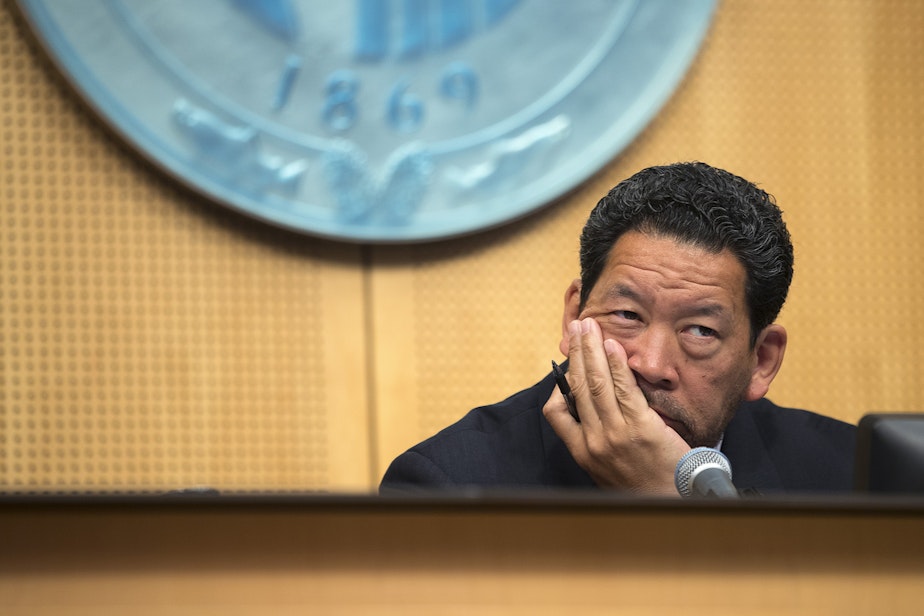What's next for Seattle drug law? Mayor, council look ahead

Seattle City Councilmember Andrew Lewis said Friday he is working with City Attorney Ann Davison’s office and other stakeholders to craft a new framework to handle drug possession cases. That’s after Lewis cast the decisive vote Tuesday to block the city attorney from enforcing a new state law.
That vote prevents the city attorney from prosecuting drug possession cases, at least for now. The new state law making drug possession and public use a gross misdemeanor takes effect July 1. Lewis said he hopes to help craft a more comprehensive proposal to bring before the council in the coming weeks.
“Look, I think we fairly well established that on this issue I’m the fulcrum vote,” he said. “So in terms of where I can apply my leadership to drive the conversation, I think I’ll be in a position to build a coalition among my colleagues.”
Lewis said any new proposal must spell out, and fund, pathways to treatment that keep people out of court and jail.
“What we need to do this month is come together as a city and do the work the people of Seattle expect us to do,” he said. “To respond with urgency to this crisis that is killing so many of our neighbors, and make sure we get it done and get it done right.”
Lewis said the plan must also come up with a new type of alternative court, since the City Attorney’s Office said last month that it would no longer participate in Seattle Municipal Court’s community court program. The program was envisioned as a way to divert low-level offenders from jail, and connect them with services. But Davison’s office said the court wasn’t effective at getting cases resolved.
Sponsored
Still, Lewis said the process should have unfolded differently.
“I think there’s plenty of room for improvement with the community court,” he said, “but I’ve always been a fan of coming up with a reformed replacement before you get rid of a current institution.”
Lewis said the city attorney’s resulting dismissal of 1,000 misdemeanor cases harms those crime victims and the defendants who needed services. He said a new therapeutic court should be “part of the puzzle” as the city considers how to enforce the drug possession ordinance. He also wants the city to offer diversion services focused on helping people with substance use disorder.
The new state law says courts and prosecutors are "encouraged" to consider diverting someone to treatment and services rather than charging them, a step known as "Pre-Filing Diversion."
Prosecutors typically contract with nonprofits that try to address the root causes of the person’s criminal case. If the person completes the steps set out by the court, the potential charges against them are never filed.
Sponsored
A spokesperson for the City Attorney’s Office provided this update on current options for diversion: “Seattle City Council appropriated additional funds to expand pre-filing diversion programs last year for 2023. Those contracts are now managed by [the city’s Human Services Department] and the City Attorney’s Office has been working with HSD to get new contracts online over the past many months."
"Two new contracts for pre-filing diversion services are set to be finalized this week and a fifth contract is under discussion," the spokesperson continued. "The pre-filing diversion providers will be Choose 180, the LGBTQ+ Center, Unified Outreach, and the Urban League. The contracts are based on a reimbursement model — the organizations are reimbursed for services that they provide.”
But Lewis said these existing contracts likely won’t be adequate.
“We’re talking about potentially doing an unprecedented volume of pre-file diversion cases," he said. "And that is going to require working with provider community with capacity for increased referrals.”
Meanwhile Mayor Bruce Harrell has announced an event on Monday, June 12, where he will convene city leaders "to establish next steps to address the drug intervention and enforcement ordinance."
Sponsored
In the announcement, Harrell said this group “will define solutions, improve system coordination, and develop implementation strategies."
Harrell said the group would also look ahead to next steps and efforts to "reconcile the Seattle Municipal Code with state law on public consumption of illegal drugs.”
The Washington Supreme Court’s 2021 Blake decision threw out the state’s felony drug law, and legislators have put a stopgap misdemeanor law in place that expires this summer. Now that legislators approved the gross misdemeanor drug law in special session (SB 5536), cities are preparing to take on these cases.




